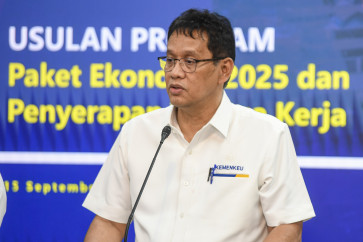Popular Reads
Top Results
Can't find what you're looking for?
View all search resultsPopular Reads
Top Results
Can't find what you're looking for?
View all search resultsSocial value based procurement: Battling graft in public procurement
By November 2016, out of 366 of corruption cases, 142 cases (30percent) were related to procurement.
Change text size
Gift Premium Articles
to Anyone
A
ccountability in public budgeting is such a difficult thing to be conducted. This difficulty roots in the characteristic of public budgeting that those who pay the bills are not the ones who make the final decisions on how the money is to be spent. The decisions on the spending are then carried out by parliaments as the community representatives. This is also the very reason as to why public budgeting is politics. The separation of payer (community) and decider (legislative and executive power holders) (Rubin, 2000) creates difficulty in providing accountability in the use of public monies, how to make sure that every cent is spent as agreed and to report accurately to the public on how money was spent.
According to the latest finding by Indonesian Corruption Watch 56 percent (33 out of 59) corruption cases during 2002 – 2007 are in public (goods & services) procurement. Further, in 2007 procurement agency is among the 60 percent of suspects of corruption.
Further, by November 2016, out of 366 of corruption cases, 142 cases (30percent) were related to procurement. As a response to the problem of accountability in the public monies use, initiatives such as participatory budgeting is thought as providing greater role of the community in the planning. Likewise, opentender.net provides more chances for community to monitor the public monies use. It is hoped that these two initiatives reduced the occurrences of corruption cases.
Participatory budgeting is intended to make sure that accountability takes place prior to budget decision. This is done by involving all members of the community to brainstorm ideas on what kind of project development they need, and further to decide how much tax money will go for that project.
Participatory budgeting is considered as the re-invention of democracy as community finding back their right by deciding (through voting) which project development they think will benefit most people in the community.
On the other hand, opentender.net provide an early warning system for corruption detection. Through opentender.net community and other parties will be able to see how much tax monies are spent on what kind of projects procured to private sectors and which enterprise or business entities win the project.
In regards to the enterprise, institution or any business entities that win the procurement, researchers have been providing proves that even small and medium enterprises are hardly winning the procurement. In fact, winning the procurement does not always mean certain enterprises are having the ability to do the projects being procured. Many factors define the winner of the projects being procured and most of these factors are political.
In the other side of the world, the United Kingdom has started an approach to social economy betterment so-called The Public Services (Social Value Act (http://www.socialvalueuk.org/) in 31 January 2013. The Public Services (Social Value) Act requires people who commission public services to think about how they can secure wider social, economic and environmental benefits. It is intended to get more value for money out of procurement. Further, it encourages commissioners to talk to their local provider market or community to design better services, often finding new and innovative solutions to difficult problems.
Within the UK, this social value act has been implemented by city councils across the country. In cities such as Liverpool social value act is embedded in public procurement. This will mean that the government incorporates social values as one of the requirements for any agencies enroll in procurement of public works or public services provision. Social value may contribute the better use of public monies for it emphasize not only efficient use of public monies but also effective public procurement. The goal of obligatory inclusion of social values in public procurement is value for money and further deeper and greater social values, hence reducing the corruption occurrences in public procurement.
Social values based procurement will provide greater opportunities to social enterprise. Social enterprise is understood as business with social purpose, and this social purpose is embedded in the provision of works and services provided by the government. Social enterprise has three distinctive characteristics. First, it has social mission core to their purpose.
Second, it generates the majority of their income through trade in which revenues mainly from goods and services provide not grants or donations. Third, it reinvests the majority of their profits toward the social mission. These three characteristics make social enterprise a perfect candidate of the winner of social values based procurement.
One of fine example is Bulky Bob’s in Liverpool City. Bulky Bob’s is a social enterprise under the name of FRC Group and has social purpose of ending furniture poverty. Through Bulky Bob’s, FRC has work in partnership with the government by winning the social values based procurement, in providing services of free unwanted bulky household item collection without which will end up in landfill site as wastes.
Through the social value based procurement, any public work or public services will be no longer prone to corruption. In traditional public procurement, the winning organization or enterprise is aiming only on the economy of the work or the services, hence easy targets for corruption. However, social value based procurement will give way to social enterprises to play their role in providing services, in which the profit will be reinvested into their social purpose, not the personal or solely enterprise profit. Re-investment to the social purpose will be a solution to the corruption in procurement. In Government of Indonesia, brace yourself, there are many social enterprises in Indonesia at this moment.
---------------
We are looking for information, opinions, and in-depth analysis from experts or scholars in a variety of fields. We choose articles based on facts or opinions about general news, as well as quality analysis and commentary about Indonesia or international events. Send your piece to academia@jakpost.com. For more information click here.










